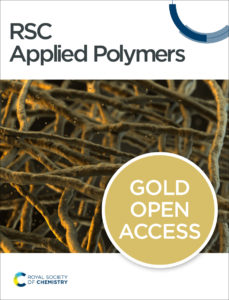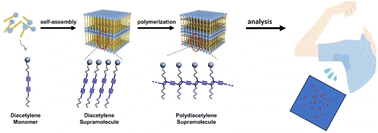RSC Applied Polymers has published its first articles. To celebrate this we wish to introduce some of our #RSCAppliedfirst50 authors and their recently published articles.
In this post we feature corresponding author Dr Rachel Hand for the article ‘A simple approach to determining the efficacy of antiperspirants using paper-based colorimetric paper sensors: SweatSENSE’.
An Introduction to ‘A simple approach to determining the efficacy of antiperspirants using paper-based colorimetric paper sensors: SweatSENSE’ by Dr Rachel A. Hand.
Antiperspirant is a vast global industry, as worldwide it is used at least daily by a majority of people to tackle the perceived problem of sweat. However, prior to SweatSENSE, there was no simple way to assess the efficacy of new products in a variety of environments.
SweatSENSE is a project that started during my PhD and over the years has seen a number of researchers work collaboratively across the University of Warwick and Unilever to progress it from the paint brush tests we started with to the inkjet-printed paper-based sensor in use globally by Unilever today. The device is also patented and can be seen in use as a marketing tool here: https://www.youtube.com/watch?v=myRleLw5TNM
Our imidazolium derivative of polydiacetylene is key to the device as it is changes in polarity that disrupt the conjugation within the polymer itself that provides the colorimetric element of the sensor. Our modifications mean that the polymer is not hydrochromic; it does not exhibit a colour change (from blue to red) to water, but does react in the presence of weak organic acids (known malodorous components of sweat). We also demonstrated that body temperature does not invoke the colour change, this coupled with the tuned reaction time eliciting a full axilla response in 5 seconds means that the device can be used globally, including in climates with high humidity, enabling simple fast worldwide testing with no need for challenging storage and transportation of samples.
Furthermore, we demonstrated that the device can be used to differentiate between people using different products in the underarm and within this we observe greater differences in, and therefore it is easier to differentiate between subsections that are grouped based on the level of sweat typically produced, compared to using the traditional method.
Finally, the authors dedicate the paper in the memory of Dr Maria Grypioti.

Rachel Hand
Rachel Hand graduated from the University of Warwick with a Master of Chemistry with Industrial Training degree (MChem. (Hons.)) in 2015. As part of this, Rachel spent the third year of her undergraduate degree working in industry at Ashland Specialty Ingredients before returning to Warwick to complete her degree with an MChem. research project in the group of Professor Dave Haddleton entitled ‘The Synthesis and use of Macromonomers by Catalytic Chain Transfer Polymerisation (CCTP).’ Rachel remained in the Haddleton group to complete her Unilever sponsored PhD entitled ‘Novel Devices for Sampling and Analysis of Volatiles.’ in 2019. She then spent 21 months as a Partnership for Clean Competition (PCC) funded PDRA working on Molecularly Imprinted Polymers (MIPs) for the detection of Anabolic Androgenic Steroids in biological samples at De Montfort University, Leicester (with Prof. Nick Turner) where she remained a visiting Research Fellow until 2023. As part of this, she is also a visiting research fellow at The Open University in Milton Keynes. Rachel returned to Warwick in February 2021 where she spent two years as Unilever Research Fellow in Polymer Chemistry before becoming an Assistant Professor in Sustainable Futures (Chemistry), where she is course leader of the new transdisciplinary Postgraduate Taught MSc in Global Decarbonisation & Climate Change. Rachel’s research sits at the interface of polymer chemistry and analytical chemistry, designing and synthesising interactive polymers and new analytical methodologies for a variety of applications in the biomedical and personal care fields, with a focus on sustainability. As part of this, Rachel is also currently a thematic fellow of the Institute of Global Sustainable Development.
Rachel A. Hand, Spyridon Efstathiou, Alan M. Wemyss, Maria Grypioti, Gavin Kirby, Tammie Barlow, Emmett Cullen Tinley, Jane Ford, Andy Jamieson, Janette Reynolds, Jean Miller, Susan Bates, Ezat Khoshdelab and David M. Haddleton.
RSC Appl. Polym., 2024,2, 98-104. DOI: 10.1039/D3LP00214D.
 |
RSC Applied Polymers is a leading international journal for the application of polymers, including experimental and computational studies on both natural and synthetic systems. In this journal, you can discover cross-disciplinary scientific research that leverages polymeric materials in a range of applications. This includes high impact advances made possible with polymers across materials, biology, energy applications and beyond. |



